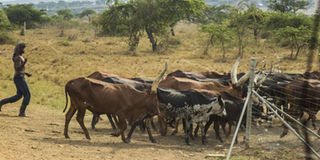Longer wait for livestock vaccine as crucial works stall

A herder in Eastern region. The threat of Rift Valley fever is real given the erratic weather patterns. PHOTO | FILE | NATION MEDIA GROUP
The development of Rift Valley fever vaccine has stalled.
International Livestock Research Institute (Ilri) has said it will take longer to develop the much-needed vaccine due to legal injunctions, threats to researchers and trespass by livestock from outside the research area in Kapiti plains.
Efforts have been hindered by an ongoing land row between Ilri and several entities claiming ownership of the Machakos Kapiti plains.
The research began in February 2017 and was supposed to have been completed by January this year, but that is not the case. This is because the land grabbing claims emerged just when the research was starting. “Up to the last two years, ‘land grabbers’ have been trying to take over our research farm in Kapiti,” said Dr Jimmy Smith, the Ilri Director-General.
During an interview, Dr Smith, said there are seven court cases which have hampered their work at the Kapiti station, and which have badly impacted on the research.
“The work we are doing is being disrupted, some in a long term manner, because of court injunctions, none of the parties can do anything on the land until the matter is resolved. With partners, we are currently doing a trial on Rift Valley fever, a very serious disease in parts of Africa,” he said.
Vandalism of expensive equipment during encroachment of the facility has also contributed to delays in the research. “The legal process of untangling ourselves is taking up time and affecting research. Daily threats to researchers have affected what has been happening in the research station,” the scientist said.
ERRATIC WEATHER
Rift Valley fever is caused by infected mosquito bites and can be passed from livestock (sheep, goats, cattle and camels) to humans and vice versa.
In Kenya, over 70 per cent of the total land mass is occupied by pastoralists and the threat of Rift Valley fever is real given the erratic weather patterns.
This is because the fever occurs after enhanced rainfall, which the Kenya Meteorological Department has said will pound most regions in the country during the 2019 October-November-December season.
Ilri has operated in the 13,000 hectare piece of land for the last 32 years and has been doing different researches including estimation of greenhouse gas emissions from livestock in Kenya and East Africa.
In September, Ilri said it had tested a vaccine to prevent transmission of disease-causing Alcelaphine herpesvirus 1 (AlHV-1) found in wildebeests at the Kapiti Research Station.
“We bought the land for the then vaccine testing. For you to do vaccine testing, you need what we call immunologically naïve animals (animals which have not been exposed to a lot of disease — ‘clean animals’),” said Dr Smith.
ERECT TRANSFORMER
According to him, clean animals cannot be taken from the market because of the possibility of them being infected with various diseases. He said it was on that premise that the ranch was converted to a research station, to produce the ‘clean’ animals to do vaccine testing. “It still remains the purpose although we have expanded the research to many other areas such as vaccine testing, research on generics and genomics, environmental sciences,” he said.
Land grabbers, he said, have opened access to the ranch and allowed livestock from outside to get in. Unfortunately, these animals could be infected with diseases and, therefore, could infect the ‘clean’ animals needed for the research.
The vastness of the land may have attracted land grabbers, but according to Ilri, it is dry and cannot sustain crop farming since it gets 200-500 millimetres of rain annually. Because of the aridness, it takes a large piece of land per year to sustain a single animal, said Dr Smith.
The Athi-Kapiti plains are also a wildlife migration corridor since the area is connected to the Nairobi National Park and grabbing and development not only affect research, but also wildlife conservation.
The land was invaded after Ilri agreed to provide a parcel for erecting a transformer believed to serve the upcoming Konza techno city.


